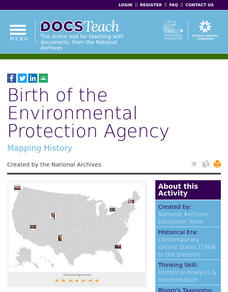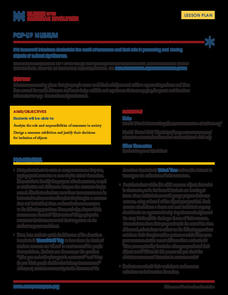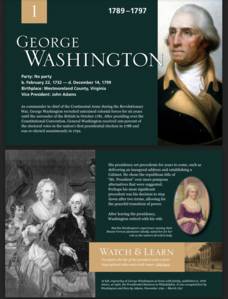Angel Island Immigration Station Foundation
Making Your Mark: Free Verse Poetry
Using the insight they have gained into the experiences of detainees at the Angel Island Immigration Station, young poets create their own free verse poems that they feel captures what it may have felt like to be an immigrant interned on...
Angel Island Immigration Station Foundation
How Do Pictures Tell the Story of Angel Island?
Young historians learn more about the history of Angel Island Immigration Station through their analysis of primary source images. Guided by a list of inferential questions, scholars learn how to make and record observations on a...
Angel Island Immigration Station Foundation
Immigration Case File Investigation
Case files for Angel Island immigrants are kept at the regional archives in San Bruno, California. Groups study one such case file to understand the life histories and different experiences of the internees and then report out their...
Angel Island Immigration Station Foundation
Interview a Family or Community Member: Taking Oral Histories
Young scholars gain insight into how historians record events by engaging in an oral history project. In preparation, class members brainstorm open-ended interview questions and take part in and debrief a mock interview simulation....
Angel Island Immigration Station Foundation
Exclusion "Act"ivity
Two simulations highlight the feelings individuals experienced when immigrating to Angel Island. During the first simulation, scholars listen to and answer questions, divided based on their answers. The second simulation pins learners as...
DocsTeach
Apollo-Soyuz: Space Age Detente
The Space Race saw the Soviet Union and the US go from competitors to partners. Scholars read a letter regarding the first docking of the US and Soviet space craft. Young historians also complete a written assignment and participate in...
Facing History and Ourselves
After Charlottesville: Public Memory and the Contested Meaning of Monuments
Are Civil War monuments a kind remembrance or a reminder of a dark past? The instructional activity focuses on the public's memory of the Civil War and the monuments that represent it. Young academics explore past efforts to change...
National Woman's History Museum
Fannie Lou Hamer and Social Activism
Not all heroes wear capes. An impactful lesson focuses on the life and activism of Fannie Lou Hamer during the civil rights movement. Scholars read her speeches and other material, participate in group discussion, and complete a jigsaw...
DocsTeach
Challenger Explosion Photograph Analysis
Young historians turn into detectives in a thought-provoking activity on the Challenger Explosion. The activity uses an image of President Reagan watching the Challenger explode on live TV to help academics practice historical analysis....
DocsTeach
Birth of the Environmental Protection Agency
Seeing is believing when it comes to climate change. An informative activity explores the creation of the Environmental Protection Agency (EPA) and its efforts to document environmental issues with photographs. Academics match images...
DocsTeach
Around the World with First Lady Pat Nixon
Travel the world with the First Lady! Academics study images from Pat Nixon's travels as First Lady to discover her role in Richard Nixon's presidency. Historians match images to world locations, complete a worksheet, and participate in...
DocsTeach
Analyzing Jackie Robinson's White House Letter
Jackie Robinson: A hero on and off the field. An eye-opening activity focuses on Jackie Robinson's social activism during and after the civil rights movement. Academics read a letter addressed to President Nixon, answer questions, and...
DocsTeach
Analyzing a Photograph of Sally Ride
Sometimes, a picture really does say it all. The activity uses a picture of astronaut Sally Ride to help elementary academics make observations and form conclusions. Young historians study the picture, complete short written prompts, and...
DocsTeach
Analyzing a Letter About Ford Pardoning Nixon
Out of the mouth of babes ... often times comes gems. The activity uses a letter written by a third-grader in 1974 regarding President Ford's pardon of Richard Nixon. Scholars analyze the letter, complete a worksheet, and participate in...
Facing History and Ourselves
After Charlottesville: Contested History and the Fight against Bigotry
History doesn't always reflect all sides. Academics discover how the remembered history of the Civil War differs for White and African Americans. The instructional activity explores how Civil War monuments and celebrations have racist...
Museum of the American Revolution
Object Observation: Purpose on a Powder Horn?
Young archeologists discover the significance of ordinary objects from the past in an interesting lesson on artifact analysis. The activity focuses on examining the image of a powder horn from the Revolutionary War to understand what it...
Museum of the American Revolution
Pop-Up Museum
Museums offer more than interesting exhibits—they are key to keeping history alive. An immersive activity uses a virtual field trip to show academics the importance of museums in preserving history. Young historians learn how museums are...
Museum of the American Revolution
George vs. George
It's George versus George in the battle for the American colonies. An interesting activity compares the leadership of George Washington and King George III during the American Revolution. Scholars read text, compare portraits, and...
Museum of the American Revolution
People of the Revolution
It's nothing new—America has always been a melting pot of cultures. The resource explores the diversity of individuals living in the American colonies during the Revolutionary War. Scholars examine artifacts and primary sources to...
Museum of the American Revolution
Dunmore's Declaration
To fight or not to fight, that is the question. A thought-provoking activity focuses on the Dunmore Declaration that promised to free enslaved people who chose to fight for the British during the American Revolution. Scholars read the...
Museum of the American Revolution
Dissecting the Declaration
Delve into the past to understand the issues that led to the Declaration of Independence. Academics read excerpts from the Declaration of Independence and take a virtual tour of the American Revolution Museum. The resource explains how...
Museum of the American Revolution
Hamilton Was Here: Rising Up in Revolutionary Philadelphia
Hamilton may be a hit Broadway show, but there is so much more to learn. An eight-unit resource guides young historians through the life of Alexander Hamilton and the Revolutionary War. The lessons include hands-on-activities, writing,...
C-SPAN
Virtual Presidents Exhibit
Scholars get a glimpse into the lives of all 46 Unites States presidents. An engaging timeline details each president's background and time in office. LInks send pupils to a website with more in-depth information.
Museum of the American Revolution
Image Analysis: In Their Own Words
Images often convey more than words. Scholars examine political cartoons from the American Revolution to understand how images have the ability to express political ideas. Academics participate in group discussion, complete a worksheet,...

























